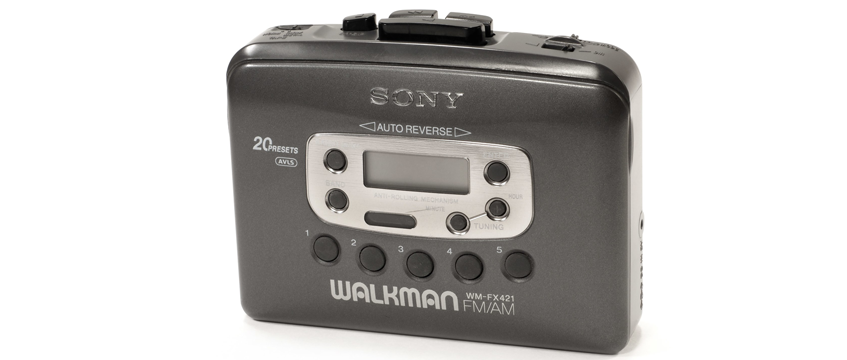Decision-making is never easy, especially in real estate. Should you rely on gut instinct or, in a world of increasing transparency and open data, are the spreadsheet ninjas delivering the best results?
When Sony‘s then 70 year-old co-founder Masura Ibuka conceived of the Walkman in 1978 as a way of listening to his beloved opera on trans-Pacific flights he was met with a wall of cynicism by the company’s trendy young management team.
Why would the market want a listening device that did not have a record function? Why would people choose to isolate themselves from the world using clunky earphones associated with the hard of hearing and elderly?
The idea was comprehensively slammed in the press, but Ibuka insisted that the project go ahead, refusing to listen to any research and development.
The rest, of course, is history. The product made untold fortunes for Sony and revolutionised the concept of personal audio.

It is perhaps the ultimate example of gut instinct triumphing over the use of research and making a successful call against the weight of market perception. But of what use is that lesson from Sony to the real estate industry?
A more transparent age
Property is historically an opaque industry built by entrepreneurs and speculators who have relied on gut instinct to make their fortune. However, in recent years the market has become ever-more transparent as a copious amount of data has proliferated.
With the advancements of proptech, many investment decisions are being made by spreadsheet ninjas that have never visited the properties they are trading nor have they spent time operating in those markets.
With the onset of such advancements the industry is at a crucial juncture. Tech specialists argue the market should rejoice at entering into a more transparent age where decision-making is more efficient and exact, while others warn that this could lead to a lack of accountability, common-sense thinking and the loss of an art form that has seen industry greats make revolutionary calls on the market.
“I don’t really know exactly how much skill is really involved in property investment. If you look at finance for example the people who are supposedly quite skilled at picking stocks are not necessarily that good and in a lot of cases just got lucky,” says Chlump Chatkupt, founder and chief executive of Placemake.io.
“Computers just do a better job and it will be the same in real estate.”
Chatkupt is developing what he calls the Bloomberg for locations, combining numerous sources of data to provide live valuations from which trading decisions for property can be made. These include traditional data sources such as the Office for National Statistics, Ordnance Survey and Land Registry, but also non-traditional data such as footfall, social media data, search data and trends, sharing economy data, satellite imagery and sensor data.

In theory, it subsequently becomes unnecessary to visit a property as factors such as maintenance demands, deterioration and the ongoing changes to the surrounding area can all be monitored and quantified in real time.
Chatkupt predicts that algorithms will soon make investment decisions in property, which would be helped by the advancement of exchanges where units in properties can be traded in a liquid fashion.
“These days, most finance trades are performed by algorithms and a lot of the big funds are replacing fund managers with computers. In real estate, first you will see more of a ‘quant’ revolution – where people are using more quantitative measures to make valuations – and after that you will see AI and more sophisticated algorithms come in,” he says.
Surely though, these algorithms will fundamentally be driven by human judgment determining what factors are most valued within those computerised calculations? Not according to Chatkupt.
“A lot of algorithms were originally developed by algotraders but they were simplistic. Now you have AI algorithms that are more sophisticated and can learn on their own, identifying patterns so they don’t really need to be maintained by people once you put them in place.”
An over-reliance on data?
Not all proptech advocates foresee quite such a seismic change in mentality, however. Some see a more blended use of technology and instinct as the future with technology used to hone strategy.
“When technology is used to generate and record data points in a single place, which are easily consumed and analysed, users can get real-time information and make strategic decisions,” says Sebastian Abigail, senior director at VTS.
“Tech platforms like VTS provide key insights into occupier demand, viewing activity, occupancy rates, in-place tenant health, current lease terms, and net effective rents. This helps investors drive returns, bid competitively and develop strategies which allocate capital effectively and invest in ‘in demand’ assets, delivering real return on investment. Gut-feel is important but when backed-up by data, better decisions can be made faster,” he says.
Keith Breslauer, chief executive of Patron Capital, says that many of the mistakes made by investors that brought about the global financial crisis happened as a result of an over-reliance on spreadsheets and data and is concerned that there could be a repeat of the past.
If the onset of technology truly advances at the rate at which it is anticipated, should we mourn the loss of the entrepreneurial inspiration and fundamentally the human touch?
“Those guys didn’t use their gut instinct, they used their spreadsheets and they didn’t walk the streets to see these properties and funds lost a lot of money. Anyone worth their salt with proper real estate expertise would have done their homework and said, ‘What you’re doing is completely insane, you shouldn’t be doing that’,” he says.
“New technology and the provision of data is being pitched as a way of driving efficiency of pricing. That is correct to a point but who is doing the underwriting, going out and kicking the tyres?”
For property investors, Breslauer is an advocate of the book on behavioural science Thinking, Fast and Slow by his fellow Chicagoan and economist Daniel Kahneman, which compares the merits of instinctive and emotional thinking with deliberative, logical and cognitive thinking.
Kahneman references heuristics, methods of decision-making that are hardwired into our way of thinking, but that can often be incorrect. This is most notable in loss aversion, which commonly sees people substantially value not losing something over gaining something of equal value. This is despite humans being more likely to recall past wins when making decisions than losses, as evidenced in casinos and betting shops up and down the country.
“My conclusion to all that is you’ve just got to be super careful. Clearly there’s an intuitive element to real estate, particularly in the opportunistic space but if you rely too much on intuitive judgement and don’t check the cognitive aspect you can find yourself making serious mistakes. I always find myself having to hold myself back. One without the other is wrong. Both are good. We try to use both,” Breslauer says.
Divergence in thinking
Having that blend of skills within one person can be rare. Instead, having a blend of skills within an organisation may be easier to achieve.
Richard Upton, U+I’s deputy chief executive, is a highly instinctive decision maker, whereas U+I’s chief executive, Matthew Weiner, is much more forensic. According to Upton, this combination is highly beneficial rather than combative.
“Matthew is the polar opposite of me. According to professionals we shouldn’t be able to understand a word of what each other are saying but we get on better than anyone else in the business and never disagree on a decision relating to risk – we usually just come to the same decision but in a different way,” he says.
According to Upton, every major positive life decision he has taken he has done so instinctively. He says that, however, many factors are considered on a spreadsheet that there will be more factors that cannot or will not have been put in due to myriad unknowns.
“My reactions are extremely quick when analysing risk, but that is based on how we are hardwired as humans and using the range of experience that I have. If a lion is coming to kill you, if you look at a spreadsheet to work out what pace it’s running, where it’s most likely to bite you and how long it’s teeth are and write up the report for your MD at Goldman Sachs then you’re dead because it’s already eaten you,” he says.

The divergence between the two types of thinking is in part driven by class according to Upton who says that those who come from poorer beginnings are forced to be more instinctive when making their decisions.
“Some of the great instinctive developers – Gerald Ronson, Irvine Sellar, Stephen Conway, Tony Pidgley – had humble beginnings and used their determination to get themselves out of the shit and as a result became sharper and therefore more instinctive. Fear, poverty and hunger are strong bedfellows alongside instinct. It is very difficult if you are privileged and have been to business school in Harvard to really hone instinct,” he says.
Gut instinct decision-making is often not conducive to corporate environments, however, and shareholders are rarely willing to rubber-stamp decisions just because a business leader reckons something.
This, according to performance expert and founder of the Conscious Leadership School Chantal Burns, is restricting success.
Having surveyed 600 employees, 64% of which were managers or above, 21% said they had ignored their instincts leading to negative results. Of the 77% who said they routinely ignored their instinct the main reasoning was due to lack of confidence, lack of authority and because they were overpowered by colleagues.
“Most of the time we try to override our instincts because we are nervous and it is hard to present something to someone, especially if it is going to be costing money or have big financial implications, who will ask how you came to that decision,” she says.
“Saying ‘it is a feeling’ is not going to cut it, so people end up fudging something so it sounds more rationale to appease people or just go along with something more data driven.”
So, if the onset of technology truly advances at the rate at which it is anticipated, should we mourn the loss of the entrepreneurial inspiration and fundamentally the human touch?
There is some hope, even from Chatkupt, whose aggressive attitude towards the adoption of tech may be perceived as edging on cold, but has a positive outlook.
“The places that we build will still be built for people by people and what we do will be driven by our own human values. Placemaking and how you define the value of a location and develop a place that serves people – there will always be that human element still there.”
Lead pic credit: mage Source/REX/Shutterstock
To send feedback, e-mail david.hatcher@egi.co.uk or tweet @hatcherdavid or @estatesgazette
 Find out how EG is working with the industry to create a contributory database to help power better, easier and faster decision-making by listening to our TECHTALK RADIO podcasts (search EG Property Podcast on Spotify, iTunes or Podbean) or visit www.egi.co.uk/radiusdx
Find out how EG is working with the industry to create a contributory database to help power better, easier and faster decision-making by listening to our TECHTALK RADIO podcasts (search EG Property Podcast on Spotify, iTunes or Podbean) or visit www.egi.co.uk/radiusdx











